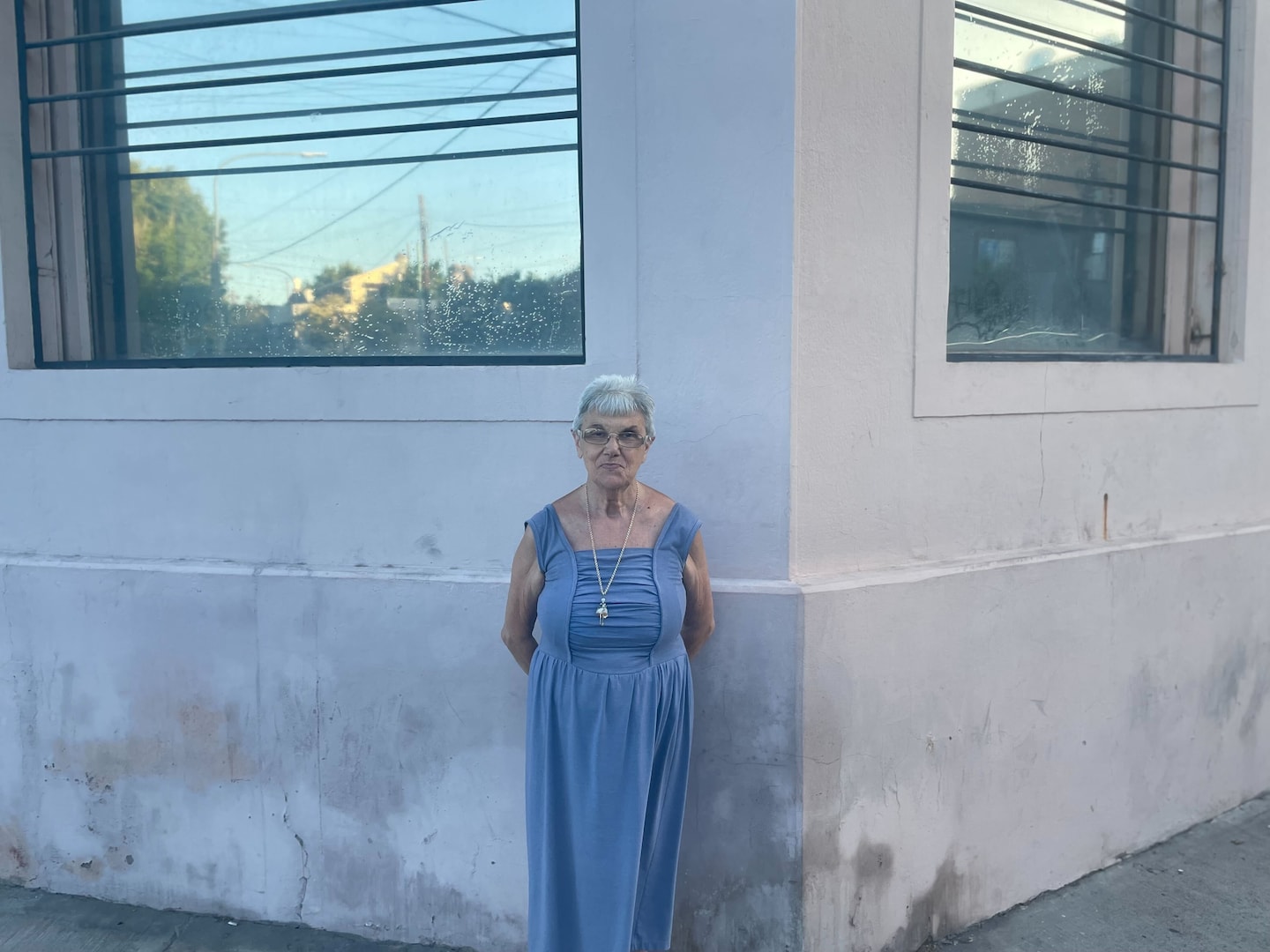But as this fútbol-crazed country prays for a win in Sunday’s final against France, it has nonetheless thrust Mariscotti up as a kind of national good-luck charm — the masked, bespectacled face of millions of fans dreaming of soccer glory.
“She’s the lucky abuela,” said her neighbor, Ariel Altamiranda, 46, using the Spanish word for grandmother. “This is more the abuela’s World Cup than it is Messi’s.”
Mariscotti honors the national obsession by listening from inside her home — the same one she’s lived in nearly her whole life — for the shouts and cheers that erupt after each victory. Then she emerges, Argentine flag in tow, to join a group of shirtless young men jumping and singing in the streets.
These spontaneous neighborhood celebrations have turned her into a viral sensation, drawing ever growing crowds to her normally quiet neighborhood on the edge of the city with each successive win.
When the Albiceleste beat Croatia in the semifinals this week, hundreds, if not thousands, descended to join in the guys’ now-inescapable chant: “Abuela la la la la la.”
“I’m not even an abuela. I don’t have grandkids. I’m an aunt,” Mariscotti said on her doorstep Thursday afternoon. “But I kept coming out to join them, and even though I was the only woman, those guys adopted me as their own.”
So too, it seems, has the rest of the country: Radio hosts have spent hours dissecting her fame. Memes featuring her face have made it onto prime time news. And seemingly everyone agrees her postgame partying with the Argentine flag is the ultimate “cábala,” a superstitious ritual that is supposed to help carry the national team to victory.
“It was totally unplanned. You cross paths with an elderly person during the celebrations, and they’re the happiest person on Earth,” said Octavio Ruggiero, 29, whose TikTok videos of Mariscotti have racked up well over 4 million views. “She always came to look for us after every game, and that just became our lucky charm.”
The Argentine reliance on cábalas — the word derives from the Hebrew “Kabbalah” — underscores the intensity and anxiety with which many here watch their national team: Mariscotti’s neighbors spoke of laying pet dogs on dining tables as they watch the games or timing their showers to end right at kickoff.
For Ruggiero and his buddies — they call themselves “los Pibes de Luro,” after the neighborhood soccer club where they met as kids — cheering with their adopted abuela after a victory has been a surefire formula for victory.
It started like this: Ruggiero gathered with his friends at Altamiranda’s house to watch Argentina play Poland in a group stage match.
They grilled beef for an asado and leaving the front door open so neighbors could stop in. Following a humiliating loss against Saudi Arabia, the selección needed a win to guarantee a place in the Round of 16.
When Argentina managed a 2-0 victory, Ruggiero and his buddies burst out of the house and celebrated. Mariscotti, down the street, had not been watching the game. But she heard the commotion and wanted to join in the party.
She put on two surgical masks, grabbed her Argentine flag and dove in — the only woman in a sea of men. “I was young once, too,” she said. “I like to party. Why not let myself have some fun?”
During soccer broadcasts, the Argentine announcer Juan Manuel “Bambino” Pons cheers some players to the tune of “Go West,” the Village People song made famous by the Pet Shop Boys: “Fideo, la la la,” for example, for winger Ángel Di Maria.
So as Mariscotti strides slowly to her neighbors’ corner, they chant: “Abuela, la la la la la!”
The celebrations reminded her of going out dancing as a girl. As a ritual, it seemed to be working: Argentina kept winning. Mariscotti made sure to wear a different color after each match — her own personal cábala.
In the quarterfinal match with the Netherlands, there was a hiccup. Argentina opened a 2-0 lead. Ninety minutes after kickoff, she headed toward Altamiranda’s house, ready to celebrate.
The street was empty. The Dutch had converted a free kick in the final seconds of stoppage time, evening the score at 2-2 to force extra time.
“Not yet, abuela!” Ruggiero and his friends shouted from inside. It took about 30 minutes and some penalties before they could return to their corner for the post-victory ritual, now joined by hundreds of people from across Buenos Aires.
Mariscotti was initially hesitant about her new role as a national good-luck charm — “What if something happens to me? Then what?” she asked. But she ultimately embraced her new role for her current obsession: Messi.
Argentina’s 35-year-old captain, considered one of the greatest soccer players ever, strikes Mariscotti as an unusually thoughtful family man. He deserves to finally win the sport’s biggest prize, she said, for a country that has not always embraced him as they it has its other soccer icon, Diego Maradona.
For Argentina, struggling with annual inflation of 100 percent and bitter political division, the World Cup has offered a temporary respite from unrelenting bad news. A third World Cup championship would boost the national spirit.
“It would be more than a soccer achievement,” Mariscotti said. “We need a moment of joy in Argentina.”
But whatever the outcome Sunday, she said, she’s is at least happy that the tournament has brought her closer with her neighbors.
As Altamiranda dropped by on Thursday to deliver a custom-made “Abuela la la la” T-shirt, he asked if the rumors he had heard were true: Had a travel agency in fact offered to fly her to Qatar for the final on Sunday?
But he stopped her before she could say much.
“The cábala can’t be cut off!” he protested. “She’s the abuela I never had. Don’t take her away from me, for the love of God.”



